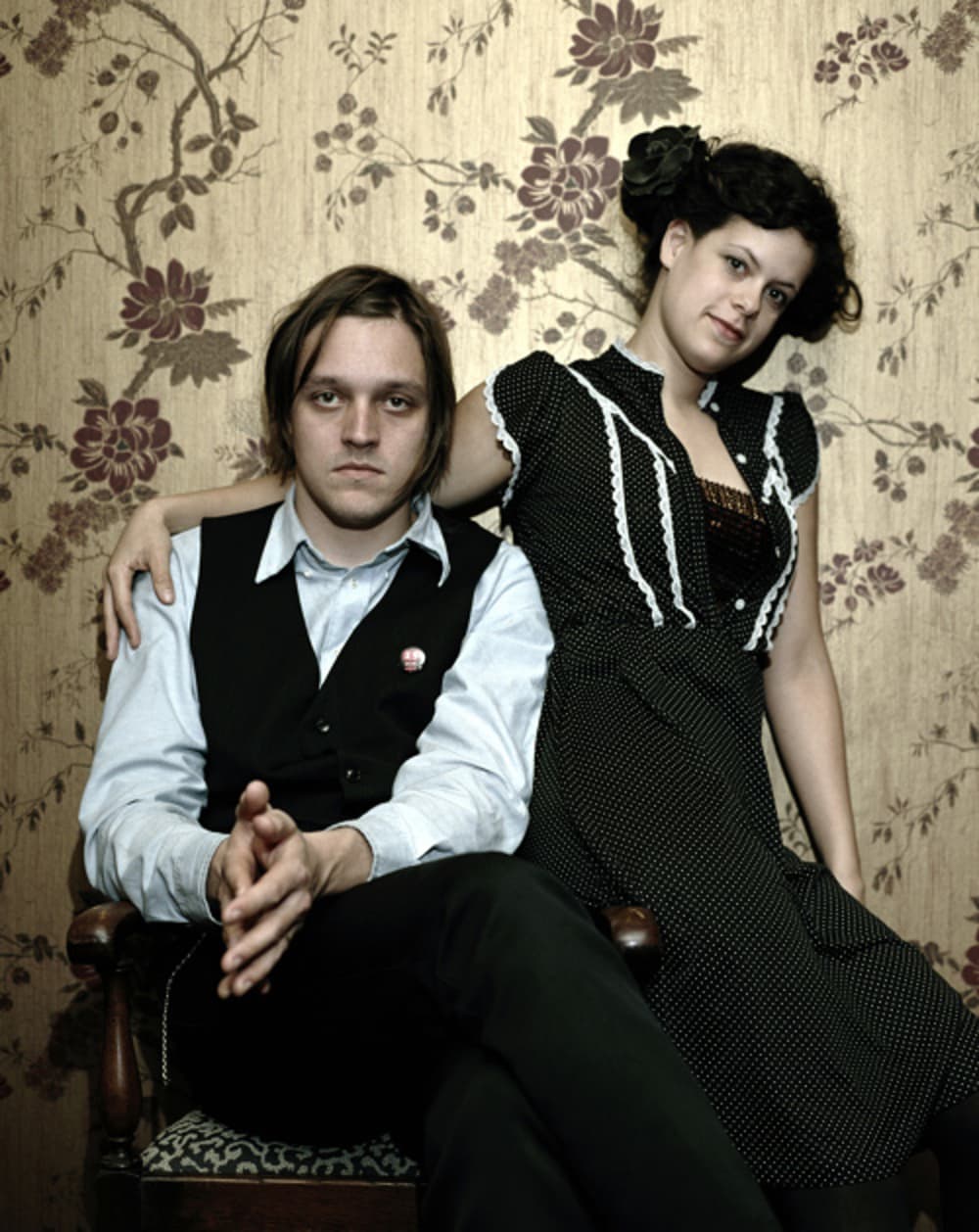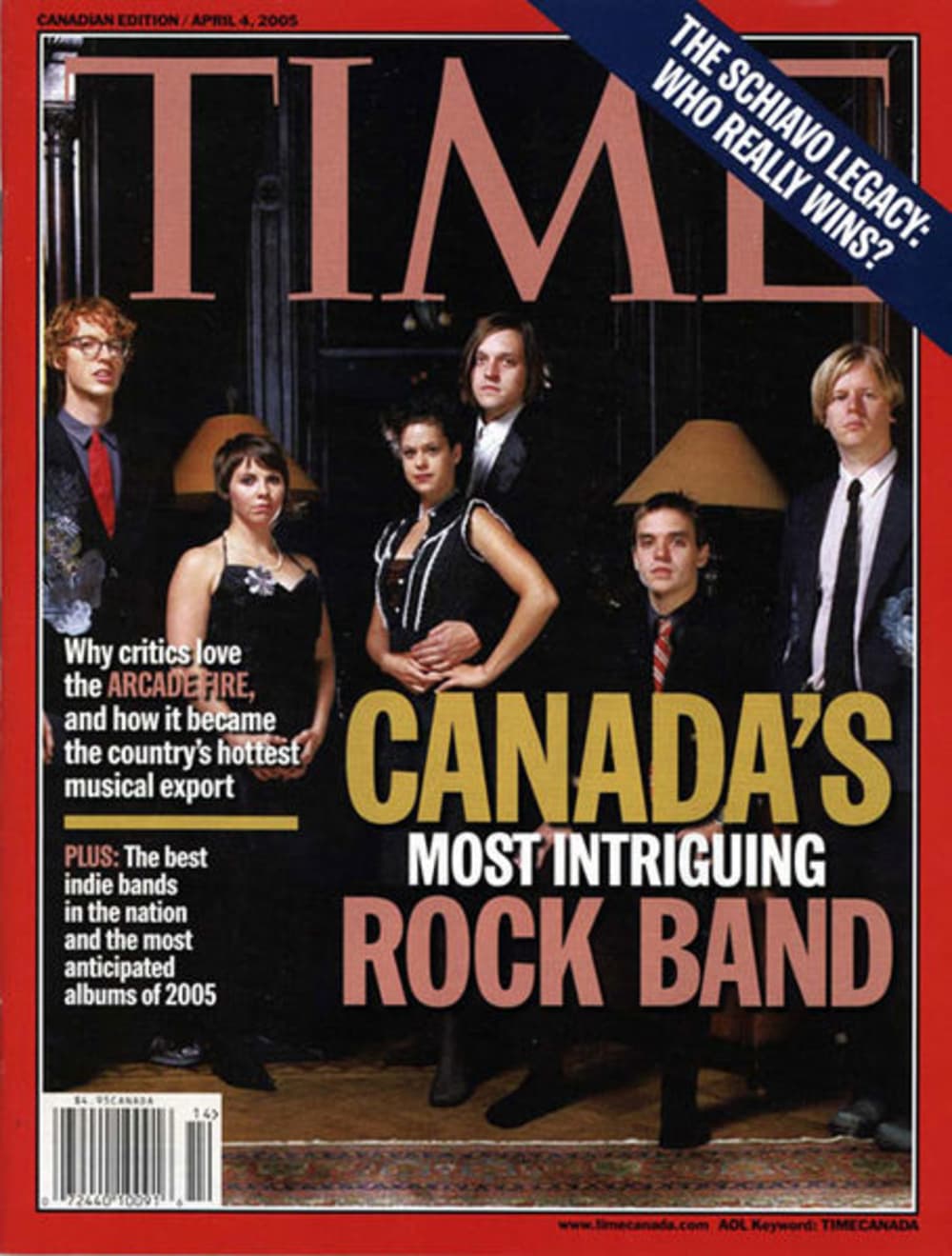The Suburbs of Houston?
Arcade Fire — and its Woodlands-raised band leader — get the classic third albumthat any rock great needs
 Win Butler and his wife/bandmate Regina Chassange are the main players in ArcadeFire.
Win Butler and his wife/bandmate Regina Chassange are the main players in ArcadeFire. Win Butler — raised in the Woodlands — riffs on life in the suburbs in ArcadeFire's new album.
Win Butler — raised in the Woodlands — riffs on life in the suburbs in ArcadeFire's new album. Arcade Fire is big enough to have been on the cover of the Canadian edition ofTime magazine — five years ago. Butler went to college in Canada, where he methis wife.
Arcade Fire is big enough to have been on the cover of the Canadian edition ofTime magazine — five years ago. Butler went to college in Canada, where he methis wife.
Arcade Fire opens up The Suburbs, their stunningly accomplished third album, with the title track, which finds (Woodlands-raised) band leader Win Butler urging his companion to steal her parents’ car so they can get out of town.
He then spends the next hour or so desperately trying to find a way back, to the past, to innocence, to home.
The author Thomas Wolfe famously claimed that such a return is impossible, but Butler’s emotional eloquence in the face of this predicament, coupled with the thrillingly varied and inspired music that his band creates to accompany him, make this a journey worth taking over and over again.
This is the classic third album that so many other great bands have made ("A Hard Day’s Night," "Born To Run," "War," "Damn The Torpedoes," "OK Computer" being just a few of the many examples off the top of my head), and Arcade Fire is the worthy inheritor of that dauntingly impressive mantle. It is their finest moment to date, which is quite a statement considering how much brilliance they’ve already shown.
The Suburbs is split in half roughly between the present and the past. In some ways, it's an album about Butler's life growing up in the suburbs of Houston — and fans of life in The Woodlands might not always be pleased with his unflinching observations.
After the jaunty yet subtly haunting piano chords of the title track set the stage for “the suburban war” to come, Butler assays his current situation with unflinching honesty.
Following the resilience of the thunderous “Ready To Start,” where the frontman stakes out his independence from both vampire-like external forces and the betrayal of those closest to him (“I would rather be wrong/Than live in the shadows of your song”), those walls of thick skin begin to crumble.
On “Modern Man” the band sinks into a buzzy, Velvet Underground-style groove while Butler expresses futile frustration at the soullessness of his daily routine. “City With No Children” contrasts warm surf-rock guitars and hand claps with fears of world wars and spiritual prisons.
On “Rococo,” with snickering harpsichords providing the impetus, Butler dares to take on his potential audience, calling the younger generation to task for not stepping up to make their voices heard (“They seem wild but they are so tame.”).
By the time the band gets to “Half Light II (No Celebration),” the modern world is rendered in quasi-apocalyptic terms, the extreme descriptions mirroring the gravitas of the broken promises suffered along the way.
Butler’s jadedness is palpable (“In this town where I was born/I now see through a dead man’s eyes”) even as his hope endures (“Pray to God I won’t live to see the death of everything’s that wild.”). The pulsating bass and U2-style, anthemic drums push the listener more toward the hopeful side of the ledger.
It is here that I should mention how much the band has evolved in terms of song structure and discipline. Always noted for its eclectic instrumentation, Arcade Fire here makes sure not to let any of that override the uniformly strong songs, instead letting those flourishes color the edges. Producer Markus Dravs does an excellent job, adding touches that accentuate the many moods that the songs evoke.
The slow-motion balladry of “Half Light I,” a duet between Butler and his wife and band partner Regine Chassagne, is an excellent example, perfectly capturing the lyrics’ juxtaposition of wonder and regret.
In the second half, Butler and Chassagne find themselves awash in memory without ever losing their self-awareness.
“Wasted Hours” takes a gently longing look at the idleness of youth, loping along like some lost Neil Young track before Butler comes to a wistful revelation: “And now I see/We’re still kids in buses longing to be free.” “We Used To Wait” ramps up the tension with taut piano and a herky-jerky rhythm, drawing parallels between the lost art of writing letters to the lack of personal connection that life circa 2010 seems to encourage.
The Suburbs essentially wraps up with a brilliantly realized two-part suite, “Sprawl (Flatland)” and “Sprawl II (Mountains Beyond Mountains).”
Both songs center on a long-lost memory of a pair of kids riding bikes, but feature drastically different takes. Butler staggers through one final look at the past in the first part, sad strings moaning behind him, unable to conjure the emotions of his childhood self or to come up with a true answer to a passing cop’s question: “Where do you kids live?”
Chassagne takes the same story in the second part and joins up with some jubilant synth-rock to revive the long-dead feelings, breaking through the shopping mall-lousy landscape to the true heart of her home. As someone who usually considered her contributions to Arcade Fire’s albums a bit of an acquired taste, I have to say that her singing here provides one of the album’s most triumphant moments.
If Funeral (the band’s first album) looked inward, and Neon Bible (their second headlined by the song "Intervention") looked outward, it’s fair to say that The Suburbs looks back.
Call it Win Butler’s Remembrance of Things Lost. On the elegantly moody “Suburban War,” Butler’s companion tells him that “the past won’t rest until we jump the fence and leave it behind.” In truth though, the past usually decides when it’s done with us.
Butler’s efforts to deal with that may be futile for him, but the wondrous music that he and his band has produced in the process should produce some powerful memories of its own for anyone fortunate enough to come across it. This is an album for the ages.
Adobe Flash Required for flash player. "Ready To Start"
Adobe Flash Required for flash player. "Half Light II (No Celebration)"
Adobe Flash Required for flash player. "Sprawl II (Mountains Beyond Mountains)"